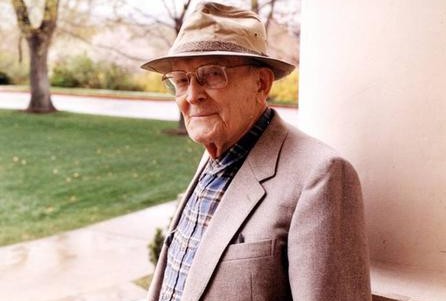These are some notes made by Hugh Nibley for his article on Priesthood which was published in Sunstone Magazine. and a Dialogue article he wrote on Blacks and the Priesthood:
How many times have the LDS got to be told that the Church is led by the Holy Ghost and not by any man? How many times must it be repeated that a Church led by revelation is a Church led by direct revelation – not by revelation to one man, who then leads the church. That man is not the Church.
In the current Melchizedek Priesthood manual, President Joseph Fielding Smith calls the idea that the Church is built on Peter as the Rock “extremely absurd” (p 188). “It is contrary to reason,” he writes, “to think that the Lord would establish his Church on any man, no matter how faithful and wonderful he might be.” And just as contrary to think that he would entrust his revelations to his people with one man, no matter how faithful and wonderful he might may be.
And then President Smith repeats that basic teaching which Joseph Smith and Brigham Young so often proclaimed: “… it is the duty of EVERY male member of the Church to know the truth, for EACH IS ENTITLED TO GUIDANCE OF THE Holy Ghost… Even female members are under obligation to ….” “EACH MEMBER of the Church should be so well versed (in the Standard Works) that he, or she, would be able to discern WHETHER ANY DOCTRINE TAUGHT conforms to the revealed word of the Lord.
Moreover, the members of the Church are entitled … to have the spirit of discernment.” They are “under obligation to accept the teachings of the authorities, UNLESS they can discover in them some conflict with the revelations and commandments the Lord has given (p 191).” “There is nothing more important in the lives of the members of the Church than to have the gift of the Holy Ghost. There is nothing of greater importance to the INDIVIDUAL MEMBER OF THE CHURCH than the gift of knowledge…by constant study and faith”
“When (the authorities of the Church) have inspiration of the Spirit of the Lord the MEMBERS of the Church should likewise, by their faith and obedience, HAVE THE SAME SPIRIT” (p 192). It is not something given to those holding certain offices.
If infallibility resides in the holding of an office, such admonitions to the Saints to “beware lest ye are deceived; and that ye may not be deceived, seek ye earnestly the best gifts” (D&C 46:7-8). Deception would be impossible if infallibility resided in an office; the Roman Catholic Doctrine of papal infallibility for declarations made ex cathedra is the easy solution, which the LDS have also preferred. For the other requires tremendous self-discipline.
We do no escape our responsibility either for our acts or our opinions and beliefs, simply by raising a hand to sustain somebody else to solve the problem for us: “First,” writes President Smith, “there should be no ‘laymen’ in the Church of Jesus Christ of Latter Day Saint … it is the duty of every male member of the Church to know the truth, for each is entitled to the guidance of the Holy Ghost if he is faithful” (p 190). There’s the rub: not “if he is ordained” but if he is faithful.
As for the leaders, whatsoever they say WHEN MOVED UPON BY THE HOLY GHOST shall be the word of the Lord. That qualifying clause, usually slurred over, is as Brother Smith presents it, (p 191) the key to the whole thing. The statement itself indicated that even the best men are not always moved upon by the Holy Ghost.
The whole question, then, is how shall we know when? To identify the Holy Ghost with the holding of an office is the easy, mechanical, automatic way, saving great wear and tear on the average Saint, but alas, however much we would like to, we cannot delegate our free agency, no matter how strongly we sustain anyone.

